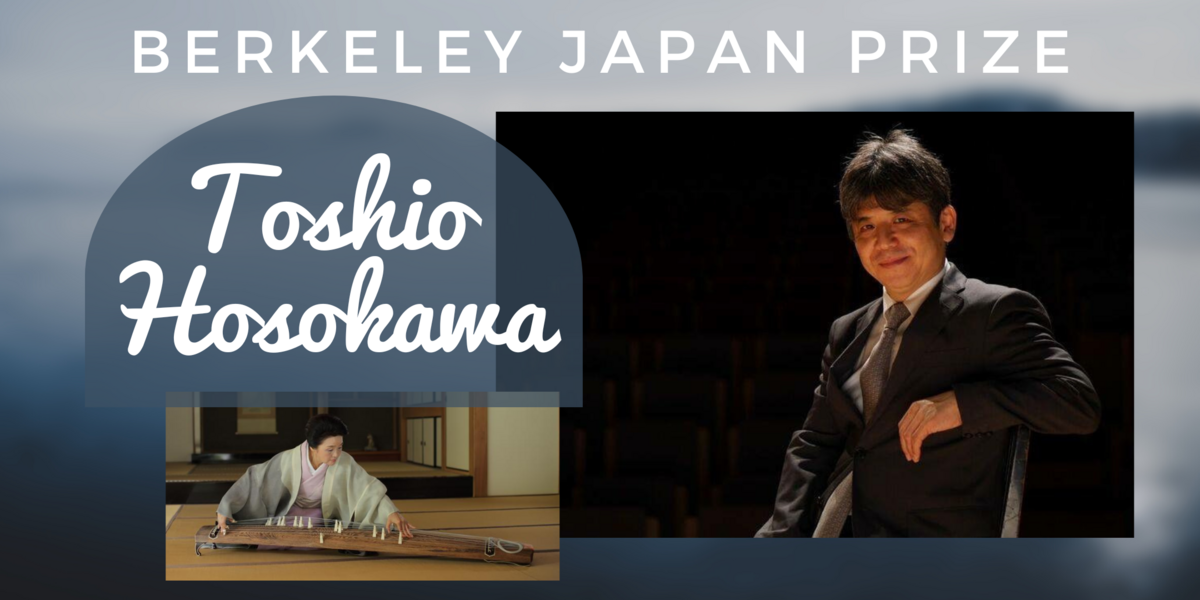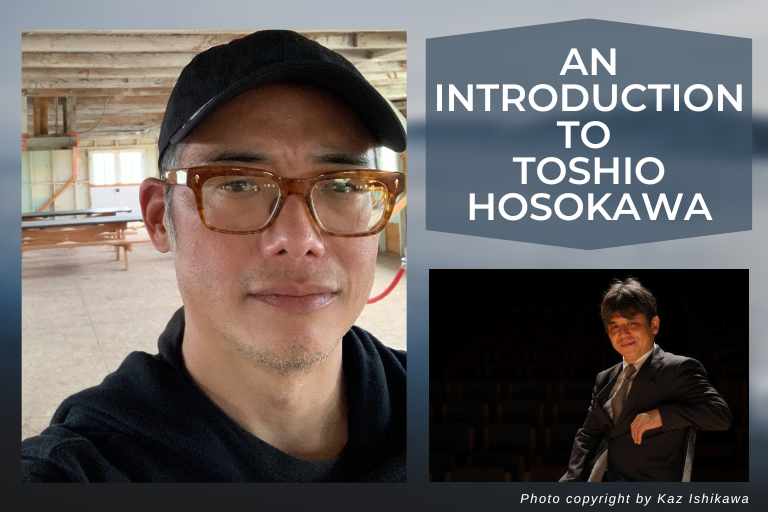
Photo Copyright by Kaz Ishikawa
Friday, January 20, 2023 | 5:00 - 6:30PM
The Faculty Club, UC Berkeley Campus | Seaborg Room
The Center for Japanese Studies (CJS) of UC Berkeley welcomes Japanese composer, Toshio Hosokawa to the campus as the recipient of the 6th Berkeley Japan Prize. At the award ceremony, Toshio Hosokawa will give an acceptance speech, followed by a performance of koto music that he composed. Kyoko Kawamura, renowned multi-instrumentalist, will play Hosokawa's "Koto-Uta".
“The calligraphy masters say that this space, where one cannot see — this silence, this white area — is just as important as linear movement. With my music, this silence, where one cannot hear, is also a part of the movement of sound energy.” Toshio Hosokawa (New York Times, August 4, 2011(link is external))
Toshio Hosokawa - Biography
Toshio Hosokawa was born on 23 October, 1955 in Hiroshima. He went to Germany to study composition for ten years from 1976, with Isang Yun at the Hochschule der Künste in Berlin and with Klaus Huber at the Staatliche Hochschule für Musik in Freiburg.
In 1980, Hosokawa participated for the first time in the Internationale Ferienkurse für Neue Musik in Darmstadt. Since then, he has been working on compositions mainly in Europe and Japan, gaining an impressive reputation worldwide as one of the leading Japanese composers and receiving commissions from primary orchestras, major music festivals, and significant opera theatres in Europe and America.
His second opera Hanjo commissioned by the Festival d’Aix-en-Provence in 2004 (Anne Teresa de Keersmaeker, staging), his orchestral work Circulating Ocean, commissioned by the Salzburg Festival in 2005 (premièred by the Wiener Philharmoniker), Woven Dreams, an award-winning work of the 5th Roche commissions in 2008 (for the Lucerne Festival and Carnegie Hall, premièred by the Cleveland Orchestra at the Lucerne Festival in 2010) won the British Composer Awards 2013, his third opera Matsukaze commissioned by La Monnaie in 2011 (Sasha Waltz, staging), The Raven commissioned by United Instruments of Lucilin, Horn Concerto –Moment of Blossoming–, co-commissioned by Berliner Philharmoniker, the Barbican Centre London, and Concertgebouw Amsterdam (premièred by the Berliner Philharmoniker in 2011) and many others were premièred under the baton of the world’s leading conductors, for example, Kazushi Ono, Jun Märkl, Kent Nagano, Sir Simon Rattle, Robin Ticciati, and Franz Welser-Möst. Many of these works have been performed as an important piece in the repertoire of each genre.
At the Salzburg Festival 2013, many works by Hosokawa were performed, including two premières: Klage for soprano and orchestra (his second commissioned work by the festival), and Ancient Voices –In memory of Wolfgang Schulz– for wind quintet (commissioned by Ensemble Wien–Berlin). With Concerto for trumpet and orchestra “Im Nebel” (premièred at The Suntory Foundation for Arts Summer Festival 2013) he garnered his third of four Otaka Prizes in 2014. In his recent works, Hosokawa is especially engaged in depicting the relationships between nature and human beings, composing works that are meant to be a prayer and a requiem. In 2014, his concertos Aeolus and Fluss, and vocal work Drei Angel-lieder were premièred in Europe. In 2015, Nach dem Sturm for two sopranos and orchestra (commissioned for Tokyo Metropolitan Symphony Orchestra’s 50th anniversary) was premièred by Kazushi Ono and the orchestra in November in Tokyo and received national premières in its concert tour around Europe.
In January 2016, his opera Stilles Meer (Oriza Hirata, original text and staging) that describes Fukushima several years after the Great East Japan Earthquake was premièred in Hamburg. In December 2017, Futari Shizuka (Oriza Hirata, original text) commissioned by Ensemble Intercontemporain was premièred under the baton of Matthias Pintscher at Cité de la Musique, Paris (concert version). In July 2018, his latest opera Erdbeben. Träume (libretto: Marcel Beyer; original text: Heinrich von Kleist “Das Erdbeben in Chili”) was premièred by Oper Stuttgart, directed by Jossi Wieler and Sergio Morabito, and conducted by Sylvain Cambreling. It attracted avid attention of many people, and was highly praised by the audience.
In 2001, Hosokawa became a member of Akademie der Künste, Berlin. He was Composer-in-Residence with Tokyo Symphony Orchestra in the 1998-2007 seasons, with Deutsches Symphonie Orchester Berlin in the 2006-2007 season, with WDR Rundfunkchor Köln in the 2006-2008 seasons, and with Nederlands Philharmonisch Orkest in the 2013-2014 season. In 2006-2007 and again in 2008-2009 seasons he was invited to be aFellow by Wissenschaftskolleg zu Berlin. In 2015, he was Composer-in-Residence with Mozartfest Würzburg. In 2012, he was elected to a member of Bayerische Akademie der Schönen Künste, München, and received the Medal of Honour with Purple Ribbon from the Goverment of Japan in autumn. In 2018, he received The Japan Foundation Award. He also received the Goethe Medal in 2021 (Germany).
Currently, he serves as Music Director for the Takefu International Music Festival, and as guest professor at Tokyo College of Music and at Elisabeth University of Music; Composer-in-Residence with Hiroshima Symphony Orchestra in the 2020-2023 season; Composer-in- Residence with Ton-Halle Orchestra, Zurich in the 2022-2023 (commission of a new flute concerto for Emmanuel Pahud). His new violin concerto “Prayer” will be premièred by the Berlin Philharmonic Orchestra in March 2023 in Berlin.
Kyoko Kawamura - Biography
Born in Tokyo, Japan, Kawamura began studying the koto at the age of 10, inspired by the performance of Kinichi Nakanoshima, a designated living national treasure. She studied Japanese traditional music at the Tokyo National University of Fine Arts and Music, majoring in koto. A multi-instrumentalist, Kawamura also studied shamisen and Japanese flute. In the last 25 years, Kawamura has also gained recognition as an interpreter of contemporary music and has performed all over the world with performers such as Yo-Yo Ma and the Nieuw Ensemble.


